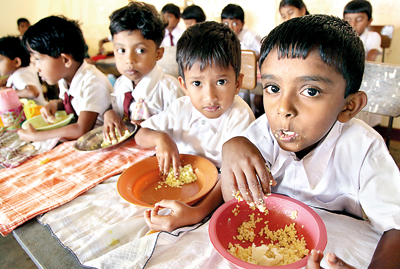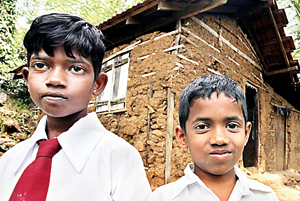A little school that refused to be written off
The meal is over and they line-up at the tap to wash their tin plates. Every grain of rice has been eaten. They wash their hands and plates and troop back into their “meal room” to meticulously wrap their plates in pieces of cloth, pick up their bottles of water and head back to their classrooms.
For about half of this school’s population, this may very well be the only solid meal they have for the day, something between breakfast and lunch, in more affluent Colombo we would call brunch.We have just seen 48 children in the age group 5-9 years, from Grades 1-5, of the remote Heneggegoda Kanishta Vidyalaya, have a meal provided by the school at 10.30 in the morning.

The little ones tuck into what could very well be their only meal for the day, provided by the school. Pix by M.A. Pushpa Kumara
The day we visited them, on a request by teacher W. Nimal Weheragoda to see the transformation of this school and the achievements of these children, the meal comprised vegetable rice, dhal and boiled egg. Unlike numerous children in the cities and towns of Sri Lanka who would want some delicacy, mostly junk food, these humble children tucked in without a murmur, no coaxing needed from the adults, for life is very hard.
This school pulled back from the brink of closure by a small band of three teachers, a volunteer teacher and Principal Osukula de Silva, commands a picturesque view of green hills and vales.
Heneggegoda Kanishta Vidyalaya on five acres of land is so much off the beaten track that woman teacher, R.M. Hiroshini Ekanayake, and volunteer M.A. Ayesha Nilmini have to take two buses and then walk another two kms up a rugged hill, re-tracing their journey on their way back home. Their slippers last only about a month due to wear and tear but they persist. Ayesha comes in rain or sunshine with no pay to teach here.
While teacher H.W. Dhammika Ruwan Kumara comes to school on his motorcycle, teacher Nimal has left his comfortable home in Balangoda to get boarded in a house near the school, without even the basic necessity of water. Drinking water has to be carried from a well across the hilly road, while he has to have his morning bath at the school itself.
It is their collective perseverance that has enabled this little school from nowhere to come on top at the ‘Samastha Lanka English Day’ in the Embilipitiya Zone held recently.
It was in January last year (2011) that Principal de Silva took over the school. Many had given up on the school which had only 17 children, but two teachers, Hiroshini and Ruwan, had not let go.The Halwinna area in which the school is located, about 8km from Tuntota Junction, off Pallebedda on the Colombo-Embilipitiya Road, is a mix of well-to-do and impoverished families, the Sunday Times is told.
Half the people in the area live off about two acres of land, cultivating not only tea but also cinnamon and pepper for their livelihood. The other half lives in abject poverty, a hand-to-mouth existence, for they are labourers who get something as a wage on a daily basis. Illness, rain or some other mishap will bring starvation in its wake. The difficult conditions under which this community lives can be measured by the fact that the one and only private bus plying here, does so only thrice a day, at 6.30 and 11 in the morning and 4 in the evening.
Catering to the children of these simple villagers, the school’s turnaround has been swift and should be an example to others.
Principal de Silva when sent here had been able to secure the services of all-rounder Nimal having worked with him in the Scouting arena. Nimal is not only creative but has also won many sports events abroad, the most recent being in Malaysia.
Being in charge of the Scholarship children, we get an “earful” of the innovative methods of teaching that Nimal is using. “As my children have to learn Tamil words, we have recorded a Sinhala version and Tamil version of a song using those words and clearly bringing out the meaning,” he says.
Sung by the children themselves and recorded, Nimal uses a radio and those cassettes, to get them singing early morning while they sweep the schoolyard or play.Earlier where there were no takers, last year parents had enrolled 11 children to Grade 1 and one child to Grade 2. This year the numbers had swelled, with 25 children seeking admission to Grade 1, bringing the roll-call to 48.
The clamour by parents for a place at the school next year has already begun. “We have 32 applications for admissions for 2013,” says Mr. de Silva.Expecting electricity in a few weeks, the school is looking forward to a computer soon, to be given under the Education Ministry’s initiative to develop schools which have fewer than 50 students.
There is a vision now for this tiny school – with the dedication and commitment of the staff, hopes are high that by 2015, all children who sit the competitive Grade 5 Scholarship examination will pass it and at least half will secure 100 marks.
Heneggegoda Kanishta Vidyalaya is set to achieve these targets, amidst many difficulties. But the teachers and children have already proven their abilities at the recent English Day celebrations.
With many schools competing, the children of Heneggegoda secured No 1 in the ‘Drama’ category, although they narrowly-missed the prize in the ‘Singing’ category on a mere technical detail. “The item needed the participation of a minimum of 20 children but we had only 11, the full complement from Grades 3, 4 and 5,” laments teacher Nimal.
A large poster in the school catches the eye – it is the 19-member band with “substitute” musical instruments. A ‘buliya’ (the large plastic container) and a pot with a balloon attached to the mouth are the drums, the illaththattuwa (the brass tray which holds betel leaves) tapped with a stick or nail acts as the cymbals while paper being rubbed together, plates, coconut shells, pots and pus pods all give rhythm and beats as well as the chal handa to the band.
Shining bright amidst the hardship
 |
Both brother and sister are first in their classes, Dishan in Grade 2 and Chathurangi in Grade 5. The teachers know their plight. Their father is believed to be dead and their mother leaves home early morning to pluck tea leaves in other people’s gardens to keep the home fires burning.
An equally bright elder brother goes on and off to a bigger school nearby which has classes beyond Grade 5. Not only the shoes of these children but also their humble home tell a tale of hardship. They live in a tiny katu-meti (wattle and daub) house and the front of their shoes flap open and shut when they walk.
While the other three children in Chathurangi’s class have no idea what they want to become when they grow up, this little girl has set her sights on teaching, a vocation to help others.
comments powered by Disqus























